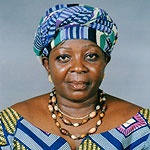Mrs. Juliana Azuma-Mensah, Minister of Women and Children’s Affairs, has said the women’s role in participating at all levels of decision making was a key priority on the development agenda of the government of Ghana.
She said government had put in place various interventions to promote gender equality in the country with the support of Non-Governmental Organizations and Development partners.
Mrs. Azuma-Mensah made this observation at the opening of a three-day inter-regional seminar on women’s political empowerment, organized by the International Institute for Democracy and Electoral Assistance (International IDEA).
The seminar on the theme, “translating women’s participation in politics into crucial actions and influence,” was to leverage for optimal approaches that translates women’s presence in leadership and decision making into critical actions and influence effective and transformative participation.
It was to bring women leaders from political parties in positions such as Secretary Generals or Deputies, Chairpersons or Vice Chairpersons and members of parliamentary caucus from Africa, the Middle East, Asia, Europe, Latin America and the Caribbean.
The platform seeks to distil and document the current experiences and strategies for translating women’s presence into critical actions and influence in politics and decision making spaces and processes.
Mrs. Azuma-Mensah said the issue of gender equality, equity and empowerment of women had become much more significant as women have strategic roles in the acquisition and communication of critical knowledge, which formed the basis of survival for communities to adjust and reduce risks in adverse circumstances.
She noted that though various policy frameworks had been adopted at both international and national levels to achieve gender equality in society, female participation in decision-making processes in all sectors of human endeavour was relatively low in comparison to their male counterpart.
“Although initiatives to enhance gender equality have been put in place by government, women in Ghana were still generally underrepresented in all sectors with the worst being in the legislature, the local government system of the Metropolitan Municipal and District Assemblies and also in the corporate environment of Ghana,” she stated.
She urged participants to consider in their deliberations strategies to engage queen mothers and other influential women in traditional authority develop guidelines for engaging the leadership of political parties to review their party constitutions to create conditions that would optimize the participation of women.
She appealed to them to come out with a communiqué to remind various governments on their commitments to the international, regional and national protocols and conventions to which they are parties.
Ambassador Mustaq Moorad, Regional Director for Africa, International IDEA, said it was important to for women to have an equal say in the political life and decision making process, but political parties have however not implemented gender mainstreaming or investigated the impact that their internal processes were having on women’s political participation.
He said there were many obstacles that prevented women from participating in political and decision-making spaces on an equal footing with their male counterparts, including hostile attitudes of communities, cultural constraints and political parties.
Ambassador Moorad noted that the attitudes and misconceptions which leads to the discrimination of women in political office were a reflection of a society where the clearly defined gender roles that were learnt in the home, and reinforced at school manifest themselves in the corridors of power.
He challenged participants to change these misguided attitudes and break down stereotypes in order to remove the major obstacle to women’s effective and transformative participation in decision-making.
“This also requires us to undertake certain interventions at the youth levels including reviewing school curricular to reflect the need to empower young women,” he added.
Politics of Tuesday, 28 August 2012
Source: GNA
Inter-Regional seminar on women's political empowerment opens in Accra

















